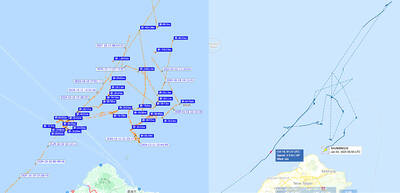The Shilin District Court yesterday dropped a case against two independence advocates for their attempt in June last year to behead a bronze statue of Chiang Kai-shek (蔣介石) in Yangmingshan National Park (陽明山公園).
Kuo Chih-kang (郭志剛), 67, and Lin Ting-ying (林廷穎), 23, were acquitted of all charges on account of a legal technicality.
The Shilin District Prosecutors’ Office indicted the two defendants on charges of damaging public property, among others, they tried to remove Chiang’s head by using an arc torch cutter on the statue’s neck.

Photo: Huang Chien-hao, Taipei Times
However, the court said that the statue was not public property as it was not officially managed by a government agency.
The statue was donated by local chapters of Lions Clubs International in 1979, but was never registered as public property by any government agency, the court said.
Kuo and Lin applied the torch cutter to the back of the statue, but were prevented from damaging the front side, so their action could be deemed an unsuccessful attempt to carry out a crime and they should be acquitted of the charges, the court said.
In interviews, Kuo said that he is the commander-in-chief of the “Taiwan Independence Revolutionary Army” (台灣獨立革命軍).
He said that he had formed a “Taiwan Nation-Building Working Team” (台灣建國工程隊) with Lin and other young activists, and they had destroyed six Chiang statues around Taiwan.
During a trial hearing in November last year, Kuo said that Chiang was a notorious dictator who was responsible for many atrocities and mass killings in Taiwan and China.
“Around the world, Chiang is counted among former leaders who were mass murderers, ranking third in total people killed under his rule,” Kuo said.
“My action should not be seen as a crime, but as performance art to highlight transitional justice,” he said. “We tried to behead Chiang’s statue to rid the nation of symbols of the authoritarian era, as many people in Taiwan still worship Chiang and maintain his cult of personality.”
In May, Kuo was sentenced to eight months in prison for taking home the head of a statue that he beheaded in April last year.

DEEPER REVIEW: After receiving 19 hospital reports of suspected food poisoning, the Taipei Department of Health applied for an epidemiological investigation A buffet restaurant in Taipei’s Xinyi District (信義) is to be fined NT$3 million (US$91,233) after it remained opened despite an order to suspend operations following reports that 32 people had been treated for suspected food poisoning, the Taipei Department of Health said yesterday. The health department said it on Tuesday received reports from hospitals of people who had suspected food poisoning symptoms, including nausea, vomiting, stomach pain and diarrhea, after they ate at an INPARADISE (饗饗) branch in Breeze Xinyi on Sunday and Monday. As more than six people who ate at the restaurant sought medical treatment, the department ordered the

A strong continental cold air mass and abundant moisture bringing snow to mountains 3,000m and higher over the past few days are a reminder that more than 60 years ago Taiwan had an outdoor ski resort that gradually disappeared in part due to climate change. On Oct. 24, 2021, the National Development Council posted a series of photographs on Facebook recounting the days when Taiwan had a ski resort on Hehuanshan (合歡山) in Nantou County. More than 60 years ago, when developing a branch of the Central Cross-Island Highway, the government discovered that Hehuanshan, with an elevation of more than 3,100m,

Taiwan’s population last year shrank further and births continued to decline to a yearly low, the Ministry of the Interior announced today. The ministry published the 2024 population demographics statistics, highlighting record lows in births and bringing attention to Taiwan’s aging population. The nation’s population last year stood at 23,400,220, a decrease of 20,222 individuals compared to 2023. Last year, there were 134,856 births, representing a crude birth rate of 5.76 per 1,000 people, a slight decline from 2023’s 135,571 births and 5.81 crude birth rate. This decrease of 715 births resulted in a new record low per the ministry’s data. Since 2016, which saw

SECURITY: To protect the nation’s Internet cables, the navy should use buoys marking waters within 50m of them as a restricted zone, a former navy squadron commander said A Chinese cargo ship repeatedly intruded into Taiwan’s contiguous and sovereign waters for three months before allegedly damaging an undersea Internet cable off Kaohsiung, a Liberty Times (sister paper of the Taipei Times) investigation revealed. Using publicly available information, the Liberty Times was able to reconstruct the Shunxing-39’s movements near Taiwan since Double Ten National Day last year. Taiwanese officials did not respond to the freighter’s intrusions until Friday last week, when the ship, registered in Cameroon and Tanzania, turned off its automatic identification system shortly before damage was inflicted to a key cable linking Taiwan to the rest of